On NBC’s new medical drama Brilliant Minds, the doctor is out.
Zachary Quinto plays Dr. Oliver Wolf, a gay NYC-based neurologist who, along with a team of interns, uses some unorthodox methods to tend to patients dealing with peculiar matters of the mind.
The character is heavily inspired by the real-life Dr. Oliver Sacks, a revolutionary medical professional and author whose research thoroughly changed the way we understand and treat neurological disorders.
Your dose of fabulosi-TEA
Subscribe to our newsletter for your front-row seat to all things entertainment with a sprinkle of everything else queer.
Sacks was also gay, though it’s not something the public knew until he addressed it in his autobiography, On The Move, which published just a few months before he passed in 2015. Set in the present day, Brilliant Minds is clearly taking some creative liberties with the late doctor’s life story, but it’s a decision that allows us to understand him as the queer trailblazer he always was—and one with a special significance to Quinto.
Now recognized as one of our most prominent out actors, the series marks Quinto’s return to NBC, the network that made him a household name with Heroes. Of course, he was still closeted (at least professionally) when the hit superhero saga premiered in 2006, so he sees the fact that he’s now playing “the first gay lead of a network medical drama” as an indication of positive evolution, both for himself and the industry at large.
But that’s not the only reason Quinto feels Brilliant Minds is a “full circle” moment for his career. In conversation with Queerty, the actor opens up about the many ways his newest role connects to his past—including the iconic Donna Murphy—and gets honest about the complexities of being out in Hollywood, even thinking back to when played the bisexual character Sasan on VH1’s short-lived cult sitcom So NoTORIous.
You can watch our conversation with Zachary Quinto in the video above, or read it in full below.
Your Brilliant Minds character Dr. Oliver Wolf is heavily inspired by a real person, the late Dr. Oliver Sacks, who had an incredible impact on the field of neurology. How familiar were you with Dr. Sacks prior to this project, if at all?
QUINTO: Yeah, I was familiar with who he was, but I knew a fraction of what I know now.
I was a big fan of the movie Awakenings with Robin Williams and Robert De Niro, directed by Penny Marshall, which is a beautiful film, it holds up today. So I knew a little bit about his work. He was, yes, a pioneer in the field of neurology, but he was also a prolific author. He was considered by The New York Times to be “the poet laureate of medicine” because he wrote inexhaustibly about his patients, he was fascinated by the lost art form of case study.
In the early 19th, 20th centuries—before medicine became so driven by technology, and before it became so driven to the diagnostic industry that we know today—the way that doctors learned about patients and how to treat them was by writing about them, and then other doctors would read those writings and add to them. So there was a much more fluid and human experience of medicine, and, in its greatest form, it aspired to literature.
Related*


Zachary Quinto plays a real-life rebellious gay doctor in this new NBC drama & it actually sounds fascinating
As an out gay actor playing an out gay lead in a network drama, Zachary Quinto calls ‘Brilliant Minds’ a “significant honor.”
And so Oliver Sacks was fascinated by that notion, and he was really, single-handedly responsible for resurrecting the art form of case study: The Man Who Mistook His Wife For A Hat—probably being one of his most famous books—but Awakenings, An Anthropologist On Mars, Musicophilia, Hallucinations, and many more. He wrote a beautiful memoir called On The Move, but he also gave TED Talks and lectures and interviews, and there was no shortage of source material for me to dive into.
He had a very complicated relationship to his identity as a gay man. He was celibate for 35 years of his life—it wasn’t until much later in his life that he was able to discover and cultivate a substantive, meaningful and sustaining relationship. So he was endlessly fascinating, endlessly complicated, and endlessly flawed, but also truly brilliant and just endlessly interesting.
In other words, a very juicy character for you to dive into.
Oh, totally!

There are so many examples of notable figures, from Dr. Sacks to Rock Hudson, who weren’t necessarily out in their heyday, and only in retrospect are we able to see them as trailblazers for our community. In your view, why is it important Brilliant Minds addresses his sexuality, and what does it mean for us to reclaim these queer heroes?
Right, well put. It’s a complicated issue in some ways. I mean, I think one’s sexual identity, and particularly one’s identity as a gay man, has historically been at odds with the concept of masculinity. It was, in many ways, in the times of Oliver Sacks and Rock Hudson, who you mentioned, and certainly Tab Hunter and Anthony Perkins and the many other gay stars who reckoned with their identity at a time when it was really a singular issue: If you were gay, then that was the thing that defined you, and it was the thing that contextualized your ability to have a relationship with a career and an industry. It was the be-all and end-all.
And so there’s something fascinating to me about being the first openly gay lead of a medical drama playing an openly gay character at a time when that is only one aspect of who I am, and it’s only one aspect of Oliver Wolf. I think that one of the reasons Oliver Sacks was celibate for 35 years—and this is a great tragedy of the time that he was born in—was because he wanted to be able to have all of the other experiences in his field that he knew that he was singularly destined and designed to have, and that if he was honest about that part of himself, he would have been denied that.
I get emotional talking about it because it’s an example of how far we’ve come, and it’s an example of how truly fortunate I am, and we are, to be living in this moment of our evolution. And it’s all the more reason that we have to defend our rights and fight for our rights to continue to live full lives, and not lives that are defined in the way that, you know, a certain faction of the political landscape in this country would have us believe we are defined—the one thing that, for whatever reason, engenders them with a fear that they cannot comprehend.
So, for me, there’s the version of it that’s like, “it’s really not a big deal!” And then there’s the version of it, which, at the same time, it’s the biggest deal right now. So it’s a lot of things happening at once, and I’m just trying to kind of hold them all and and show up for all of them as they require my attention.

Oh, absolutely. It’s something I run into all the time covering “queer media”—on one end, we want it to just be part of the fabric of our lives, and that label shouldn’t matter if this is a “queer show or a “queer character.” But on the other hand, it very much does matter than we’re sitting here right now talking to a gay man who plays a gay lead character on a network TV show—it’s major! Of course, you’ve been on NBC before, but the context here tells us this is history-making, in a sense.
Well, I don’t know about all that. I just know that, for me, it’s a very different experience than I’ve had in the past. And kudos to NBC for telling this story—I’ve had a wonderful time working with them, everybody there has been so supportive of what we’re doing and the spirit in which we’re doing it.
So, I’m very grateful that they’re creating a home for this story to be told, and that they’ve invited me back to the place that really changed my whole career when I was on Heroes over 15 years ago. But I definitely feel grateful for that return, and I think there’s no mistake that there’s a sense of return for me, personally, in my own life right now. That, in these intervening years, I’ve done a lot of work on myself, and I really try to kind of keep digging deeper in my experience, and so it’s a nice reflection of that, to come back. And I’m really grateful for that part of it, especially.
And now I’m thinking even slightly further back to when you played Sasan, an openly bisexual character on So NoTORIous. It was a different time, and you weren’t publicly out then, so I imagine perhaps your feelings toward what that role has meant to you have evolved.
Oh yeah, sure [Laughs.] I had a great time working on So NoTORIous, which I think was also, in its own way, ahead of its time, you know? But I mean it has changed, and I remember where I was in my life and in my career, and feeling like—I mean, at that time, anybody who knew me knew that I’m gay, but I hadn’t had a conversation about it professionally. And there was still a lot more stigma around it, you know, which still exists now. And so I don’t know, we just all have to bring what we can to the conversation and hope that collectively it evolves.
Related*


That time Zachary Quinto had a steamy gay sauna hookup on TV—before he was out
The sweaty make-out might be how we best remember Tori Spelling’s one-season comedy ‘So NoTORIous’
Lastly, to bring it back to Brilliant Minds, I was just going to add that Dr. Wolf’s sexuality is of course but a small part of who he is and what the show is—though if we needed any more proof that the show is “for the gays,” well… we’ve got Donna Murphy in it!
We do have Donna Murphy in it! Donna Murphy, icon of stage and screen. I love Donna. I actually worked with Donna for the first time when I was 13 years old in Pittsburgh at the Civic Light Opera in a production of Oliver, where I was one of the street urchin kids, and Donna Murphy played Nancy. It was in the early days of my relationship to theater, and I remember actually I would stand in the wings of the Benedum Center in Pittsburgh and watch her do her big number in Oliver, which is called “As Long As He Needs Me,” and just marvel at her connection to what she was doing.
I remember being a 13 year old kid [seeing that,] so yet another way in which this is kind of full circle. The thought that I would then, over 30 years later, be working with this woman and having this incredible creative dynamic with her, it’s really—and, not for nothing, Heroes, that we were talking about, and returning to NBC… The whole premise of Heroes, for anybody who hasn’t watched it, is that in the pilot episode, there’s a solar eclipse of the sun, and it awakens the powers that all these people that are just walking around the Earth have. We started filming Brilliant Minds Season One on April 8, the day of the solar eclipse?! So, this kind of crazy through line of like, “Wait, what is happening?” There’s something that’s kind of inexplicable to me about the connection that I have to this project, and so in that end, I just feel really grateful that it that we’ve found our way to each other.

New episodes of Brilliant Minds premiere every Monday night on NBC, streaming simultaneously on Peacock.
Related*
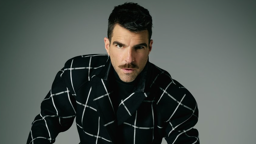
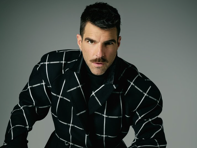
Zachary Quinto slithers on the floor in sultry photo shoot & swears he’s not as “intense” as everyone thinks
Zachary Quinto oozes sensuality with every movement, stare and pose in new photo shoot.




























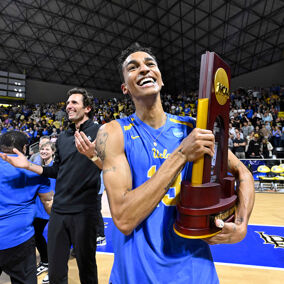
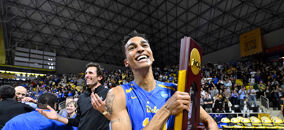








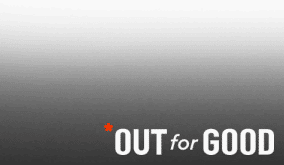









jp47
I watched SonoTORIous back in the day and thought it was hilarious. I’ve always felt Tori Spelling was talented within a certain sphere of comedy. Quinto was great as her best friend, Tori’s nanny(?) character was also wonderful and Loni Anderson as Candy Spelling was a spot on characterization, completely self-involved and clueless. Too bad it only lasted ten episodes.